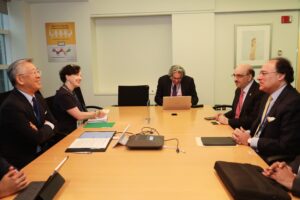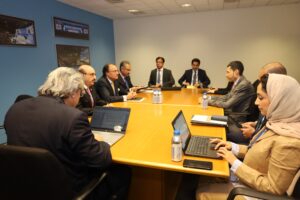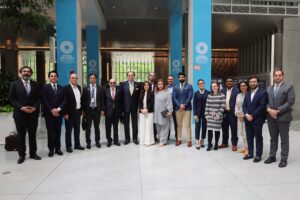ISLAMABAD, Apr 18 (APP):In a high-profile meeting held at the sidelines of the IMF/World Bank 2024 Spring Meetings in Washington DC, Federal Minister for Finance and Revenue, Muhammad Aurangzeb emphasized the need for a robust financial safety net and capacity building to address geo-economic impacts and climate vulnerabilities.
Speaking at the Middle East, North Africa, Afghanistan and Pakistan (MENAP) Ministers and Governors meeting with the Managing Director of the International Monetary Fund (IMF), Kristalina Georgieva, the minister called for a more proactive and responsive Global Financial Safety Net to tackle elevated risks, according to press statement issued by finance ministry here Thursday.
He underlined the importance of rechanneling Special Drawing Rights (SDRs), reviewing the surcharges policy, and prioritizing the Resilience and Sustainability Trust (RST) in view of Pakistan’s climate vulnerabilities.
The Finance Minister also welcomed the IMF’s renewed emphasis on capacity building through Regional Capacity Development Centers (RCDCs).
Aurangzeb highlighted the impact of geo-economic fragmentation on Pakistan’s economy and expressed gratitude to the IMF, multilateral development banks, and bilateral partners for their support in helping the country respond to unprecedented challenges.
He underscored the government’s aggressive reform agenda, including broadening the tax net, privatizing loss-making state-owned enterprises (SOEs), expanding the social safety net, and facilitating the private sector.
Meanwhile, the minister at JP Morgan Seminar on “Pakistan: Economic Policy Outlook” presented an overview of Pakistan’s economic landscape, highlighting strong performance of agriculture sector, diminishing inflationary pressures, stable exchange rates, declining trade deficit and strong remittances.
He said that the government was cognizant of the challenges/risks ahead and was taking short and long-term measures to address them. Outlining the government’s reform agenda, he identified taxation, energy and privatization as key areas of reforms for the government.
He said that the country had achieved a semblance of economic stability after the 9-month Standby Arrangement (SBA) with IMF and was fully committed to entering into a larger and extended program with the Fund to continue on the path of economic growth and sustainable development.
According to statement, Assistant Secretary US State Department, Donald Lu and Principal Deputy Assistant Secretary, Ms. Elizabeth Horst met Finance Minister at WB headquarters to underline the political will in Washington to strengthen Pak-US ties.

The emphasis during the meeting was on upgrading economic partnerships, with special emphasis on alternate energy, agriculture, climate resilience, and tech industry.
The minister briefed them on Pakistan’s reform agenda encompassing broadening the tax base, streamlining the energy sector and fast-tracking the privatization process of state-owned enterprises.
He identified emerging opportunities for American investments in IT, renewables, agriculture and minerals extraction and said that Pakistan will work closely with US International Development Finance Corporation and Exim Bank.
In addition, Aurangzeb met with United Arab Emirates’ (UAE) Minister of State for Financial Affairs, Mohamed bin Hadi Al Hussaini to discuss bilateral economic cooperation and explore avenues for strengthening ties between the two brotherly nations.

The minister expressed gratitude for UAE’s financial support to Pakistan in times of need, adding the government intended to continue with reforms initiated under the current IMF program in the priority areas of taxation, energy and privatization of SOEs.
He also expressed Pakistan’s keen interest to re-engage with Middle Eastern Banks to revive their interest in potential investment opportunities in the country.
The minister held a meeting with Hiroshi Matano, Executive Vice President of the Multilateral Investment Guarantee Agency (MIGA), a member of the World Bank Group, to discuss Pakistan’s investment landscape and measures to enhance investor confidence.
During the meeting, the Finance Minister appreciated MIGA’s continued support in attracting foreign direct investment (FDI) into Pakistan and highlighted government’s ongoing economic reforms.
He briefed Matano on the efforts being made to resolve the issues faced by a Korean investment company operating in Pakistan, underscoring the government’s commitment to addressing investor concerns and facilitating the ease of doing business.
Aurangzeb reiterated Pakistan’s focus on promoting sustainable and inclusive economic growth, emphasizing the crucial role of Foreign Direct Investment in achieving this objective.
Matano commended the government’s efforts to enhance investor confidence and expressed MIGA’s readiness to continue supporting Pakistan in attracting quality foreign investments across various sectors of the economy.
Likewise, the minister had a productive meeting with representatives from Deutsche Bank during which he appreciated the long-standing support extended by Deutsche Bank to Pakistan in various financial endeavors.
The representatives from Deutsche Bank briefed the Minister on different transaction structures that could assist the government in accessing international capital markets effectively. A key area of discussion was the establishment of a Sustainable Finance Framework for the issuance of green or sustainability bonds.
The minister also met Fund-Bank Staff Association and Vice Chairman, Public Sector, JP Morgan, Mr. Daniel M. Zelikow.

It is pertinent to mention here that Finance Minister is leading Pakistan’s delegation in the IMF / World Bank’s 2024 Spring Meetings being held in Washington DC.
Other delegates include Finance Secretary, Imdadullah Bosal; Secretary Economic Affairs Division, Dr. Kazim Niaz ; Governor State Bank of Pakistan, Jameel Ahmed and Senior Joint Secretary, Economic Affairs Division, Adil Akbar Khan.

 10 months ago
246
10 months ago
246
